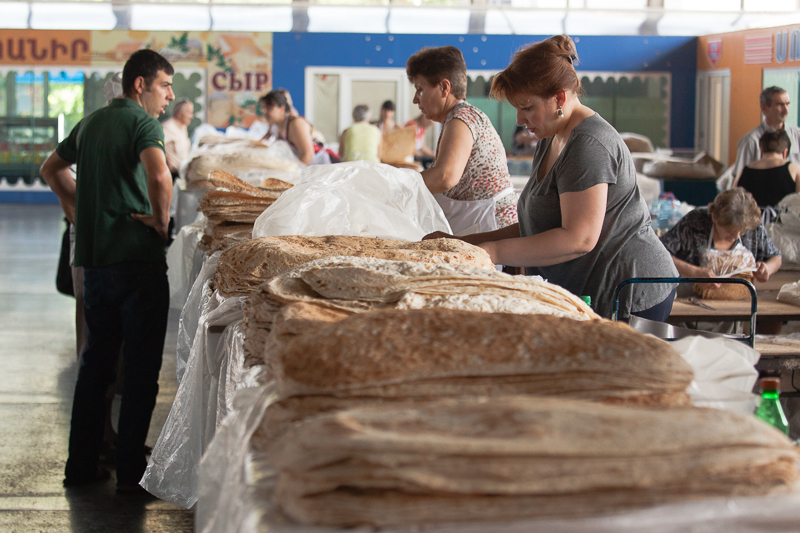The trend of growing prices began to be almost permanent in Armenia in the last 7-8 years. According to the UN, Armenia is among the top 10 countries with the highest prices of goods and services. Among the main reasons for such a bright manifestation of this trend is the devaluation of the dram. For example, the price of 1 kg of patent flour was 245 drams in the mid-November 2014, and 325 drams in mid-December. At the same time, the dollar increased from 411 to 600 AMD. After a stabilization of the currency market in the second half of December, the official exchange rate of the dollar decreased to 480 drams. Furthermore, the price of 1 kg of patent flour dropped to 280 drams in late December.
Another important reason for the increase in prices for goods and services was the increase in electricity tariffs – in just the last two years, the rates were raised three times. The rise in prices of electricity leads to a chain reaction of higher prices for most goods and, especially basic foodstuffs, including bread, which begins to occupy more and more space in the ration of citizens due to the annual deepening of the crisis in the social situation.
According to unofficial forecasts, Armenia expects another increase in bread prices by 14-20% by April 2016. The reason for this is the rise in the cost of Russian wheat by 2 rubles, or 25% per kilogram.
Experts name monopoly and oligopoly the main causes of the increase in prices in the conditions of Armenia's economy, which is entirely subordinated to the interests of the maintenance of large monopolies. The widespread dominance of monopolies supported by power has led to the virtual elimination of small and medium-sized enterprises (SMEs). The lack of real competition, not declared by the Government, leads to higher prices.

Today, the volume of wheat in Armenia covers only a third of the country's needs. Therefore, grain imports from Russia became the best option. And the grain is imported from Russia to Armenia by only two major companies, the manufacturers of flour 'Alex Grig' and 'Manana Grain' through a well-established pattern.
Since this spring, some small companies, taking advantage of Armenia joining the Eurasian Economic Union and the fall in the price of flour in Russia, which was due to a sharp drop in the ruble, have organized supplies of cheap Russian flour. It was more profitable than grain supplies, however, it was a blow to the local flour mills. On the other hand, imports of cheap flour contributed to a decrease in the price of bread, which is rare for Armenia.
At the same time, the appearance of a new scheme for the delivery of flour to Armenia caused serious concern among the monopolists, who took urgent steps to restore and use mechanisms for grain imports, forcing small companies out of the game.
The expected spring increase in bread prices was not the first time the monopolists had tried to use an increase in grain prices in Russia to raise the price of flour and bread. This increase, as a rule, is a consequence of the skillful play by the monopolists-importers on the difference in the prices of imported Russian wheat and bread in Armenia. Meanwhile, according to expert estimates, the average cost of grain is about 20% of the retail price of bread. Thus, if wheat prices increase by 25%, bread prices rise by a maximum of 5%.
However, it is possible that employers, due to tradition, will raise the price even more and save on reducing the weight of real bread.
Will the monopolists be able to play on the price difference? The Armenian authorities, "an integral part" of whom are monopolist-importers, were put in an awkward position: against the background of an extremely complex social situation, any step in the direction of the next increase in prices may be fraught with the possibility of a social explosion, as happened in the case of the recent increase in electricity tariffs. Even today, one of the key places in the draft budget for 2016 was given to the inflation control mechanism.
The coming months will show how this desire of the Government can be combined with the monopolists' intention to once again raise bread prices.






